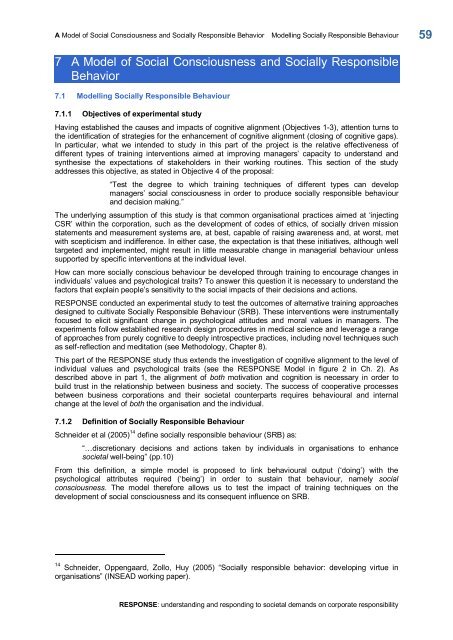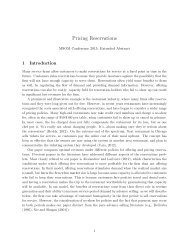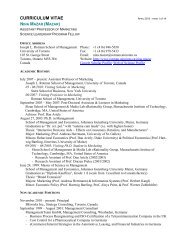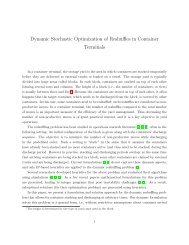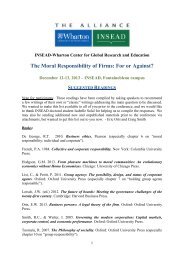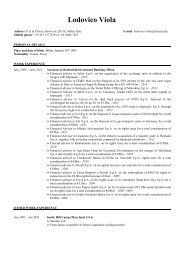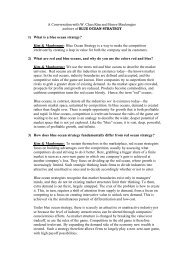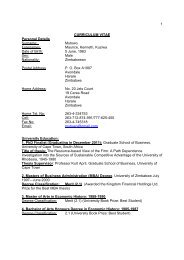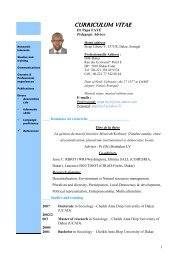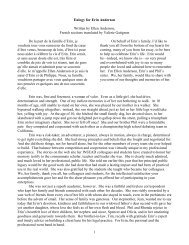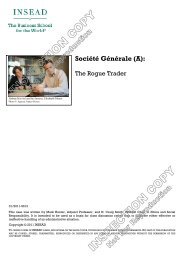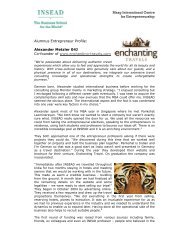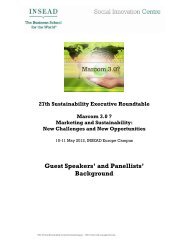RESPONSE - Insead
RESPONSE - Insead
RESPONSE - Insead
You also want an ePaper? Increase the reach of your titles
YUMPU automatically turns print PDFs into web optimized ePapers that Google loves.
A Model of Social Consciousness and Socially Responsible Behavior Modelling Socially Responsible Behaviour<br />
7 A Model of Social Consciousness and Socially Responsible<br />
Behavior<br />
7.1 Modelling Socially Responsible Behaviour<br />
7.1.1 Objectives of experimental study<br />
Having established the causes and impacts of cognitive alignment (Objectives 13), attention turns to<br />
the identification of strategies for the enhancement of cognitive alignment (closing of cognitive gaps).<br />
In particular, what we intended to study in this part of the project is the relative effectiveness of<br />
different types of training interventions aimed at improving managers’ capacity to understand and<br />
synthesise the expectations of stakeholders in their working routines. This section of the study<br />
addresses this objective, as stated in Objective 4 of the proposal:<br />
“Test the degree to which training techniques of different types can develop<br />
managers’ social consciousness in order to produce socially responsible behaviour<br />
and decision making.”<br />
The underlying assumption of this study is that common organisational practices aimed at ‘injecting<br />
CSR’ within the corporation, such as the development of codes of ethics, of socially driven mission<br />
statements and measurement systems are, at best, capable of raising awareness and, at worst, met<br />
with scepticism and indifference. In either case, the expectation is that these initiatives, although well<br />
targeted and implemented, might result in little measurable change in managerial behaviour unless<br />
supported by specific interventions at the individual level.<br />
How can more socially conscious behaviour be developed through training to encourage changes in<br />
individuals’ values and psychological traits? To answer this question it is necessary to understand the<br />
factors that explain people’s sensitivity to the social impacts of their decisions and actions.<br />
<strong>RESPONSE</strong> conducted an experimental study to test the outcomes of alternative training approaches<br />
designed to cultivate Socially Responsible Behaviour (SRB). These interventions were instrumentally<br />
focused to elicit significant change in psychological attitudes and moral values in managers. The<br />
experiments follow established research design procedures in medical science and leverage a range<br />
of approaches from purely cognitive to deeply introspective practices, including novel techniques such<br />
as selfreflection and meditation (see Methodology, Chapter 8).<br />
This part of the <strong>RESPONSE</strong> study thus extends the investigation of cognitive alignment to the level of<br />
individual values and psychological traits (see the <strong>RESPONSE</strong> Model in figure 2 in Ch. 2). As<br />
described above in part 1, the alignment of both motivation and cognition is necessary in order to<br />
build trust in the relationship between business and society. The success of cooperative processes<br />
between business corporations and their societal counterparts requires behavioural and internal<br />
change at the level of both the organisation and the individual.<br />
7.1.2 Definition of Socially Responsible Behaviour<br />
Schneider et al (2005) 14 define socially responsible behaviour (SRB) as:<br />
“…discretionary decisions and actions taken by individuals in organisations to enhance<br />
societal wellbeing” (pp.10)<br />
From this definition, a simple model is proposed to link behavioural output (‘doing’) with the<br />
psychological attributes required (‘being’) in order to sustain that behaviour, namely social<br />
consciousness. The model therefore allows us to test the impact of training techniques on the<br />
development of social consciousness and its consequent influence on SRB.<br />
14 Schneider, Oppengaard, Zollo, Huy (2005) “Socially responsible behavior: developing virtue in<br />
organisations” (INSEAD working paper).<br />
<strong>RESPONSE</strong>: understanding and responding to societal demands on corporate responsibility<br />
59


